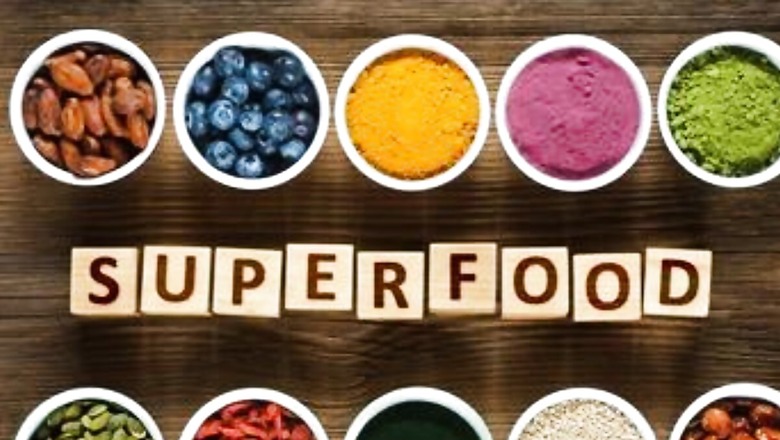
views
In recent years, there is a food term that has been doing the rounds massively and that is ‘Superfoods.’ Most people often come across this term on the internet or on large hoardings on the streets but no one truly is aware of what it stands for and all that it has to offer. However, the time has come to change the narrative.
Many of us often miss out on the fact that these superfoods have been an integral part of the usual human diet for centuries. In one way or the other, we have been consuming these superfoods but with time medical experts have been suggesting that it is only suitable to consume items from this food group a little more often.
What Are Superfoods?
Ms. Rutu Dhodapkar, Dietetics Team, P D Hinduja Hospital and Medical Research Centre, Khar, explains, “Superfoods are foods — mostly plant-based but also some fish and dairy — that are nutritionally dense, containing lots of vitamins, minerals and antioxidants that are good for one’s health. Superfoods are foods that have a very high nutritional density. This means they provide a substantial amount of nutrients and very few calories. They contain a high volume of minerals, vitamins, and antioxidants.”
Ms. Ritika Samaddar, Regional Head – South Zone, Dietetics, Nutrition and Dietetics, Max Super Speciality Hospital, Saket points out, “Millets being gluten-free are excellent for the gut. Loaded with fibre and proteins and other micronutrients like calcium, iron, and millet are good for diabetics, and heart-friendly. Tiny superfoods such as seeds contain all nutrients in concentrated form. Seeds commonly consumed like pumpkin seeds, sunflower seeds, melon seeds, flaxseeds, chia seeds and sesame seeds are high in good quality protein, contain heart-friendly fat and are loaded with vitamins and minerals.”
“Further, nuts like almonds are one of the most nutrient-dense superfoods around. Loaded with protein, fibre, vitamins and minerals, almonds pack a powerful nutrient punch. From heart health to weight management, diabetes and gut health, almonds benefit in so many ways,” she added.
It must be remembered that indigenous foods that are available locally are powerful superfoods that can be substituted for expensive and hard-to-find exotic superfoods. Additionally, many exotic superfoods may not be suitable for the Indian palate and taste preferences. Ms. Ritika Samaddar points out, “A few examples are the moringa leaves which are the local drumstick leaves we seldom take. These are freely available and can be taken as a saag or dried and taken as a powder. Rich in iron and high in fibre. Similarly, we have local berries like jamun, shahatoot (mulberry) which are equivalent to the goji berry and blueberries, but much cheaper and easily available.”
Benefits Of Superfoods
- Avocados are known to be helpful in reducing the risk of heart disease due to their high content of poly and mono unsaturated fats, which are considered good fats.
- Ms. Rutu Dhodapkar, says, “Cruciferous vegetables show health benefits such as lowering the risk of cancer and preventing heart attacks and stroke. Eg- Broccoli, Brussels sprouts, bok choy, cauliflower, cabbage. They are full of fibres and give a feeling of fullness that also can be taken by those who are on a weight reduction regime.”
- She further added, “Seafood provides omega 3 fatty acid provides eicosapentaenoic acid (EPA), and docosahexaenoic acid (DHA), are used more efficiently than the third type of omega-3, alpha-linolenic acid (ALA), which comes from plant sources such as flaxseed and nuts. omega-3s can help play a role in reducing your risk of heart attack and stroke, alleviating depression.”
- Allium vegetables like chives, onions, garlic, and leeks have many health benefits as they are antibacterial and antiviral properties. Allium vegetables play a role in preventing cancer, and garlic in particular may benefit people living with diabetes, high cholesterol, and high blood pressure.
- Ms. Ritika Samaddar, notes, “Certain superfoods, which are high sources of fibre like kale, millets, seeds and nuts can help in weight loss. However, to get the maximum benefits along with the intake of superfoods one needs to reduce the intake of processed and unhealthy foods.”
- “For weight loss especially in terms of fat loss, one needs a combination of a healthy balanced diet which is high on fibre with protein and low on carbohydrates especially refined and processed carbs. But along with a diet active lifestyle comprising of good exercise and reduce stress and adequate sleep all play an important role,” she went on to add.
- Mushrooms have been considered a superfood and are still used in traditional Chinese medicine to cleanse the body and promote longevity. These items possess properties that are anti-bacterial, anti-oxidant, and anti-inflammatory.
- Nuts are super powers almonds for heart health, cashews for cognition, Brazil nuts for cancer — but all are a great source of fat, fibre, and protein
- Seeds like flaxseeds, chia seeds, and hemp seeds are easy to incorporate into your diet and are packed with vitamins and minerals.
- “Resveratrol, the polyphenol found in wine that made it famously “heart healthy”, is present in the skins of red grapes. Resveratrol is beneficial for treating Alzheimer’s disease, relieving hot flashes and mood swings associated with menopause, improving blood glucose control and keeping “heart healthy”. Flavonoids are also present in grapes, quercetin, is a natural anti-inflammatory that appears to reduce the risk of atherosclerosis and protect against the damage caused by LDL cholesterol in animal studies. Quercetin may also have effects that act against cancer,” says Ms. Rutu Dhodapkar.


















Comments
0 comment